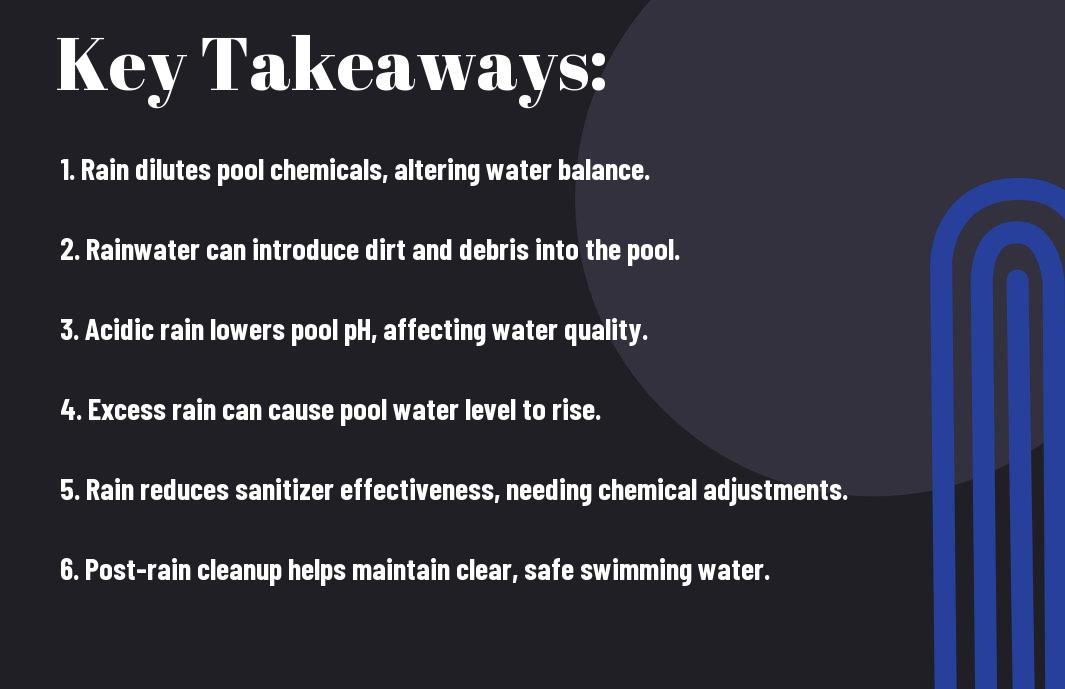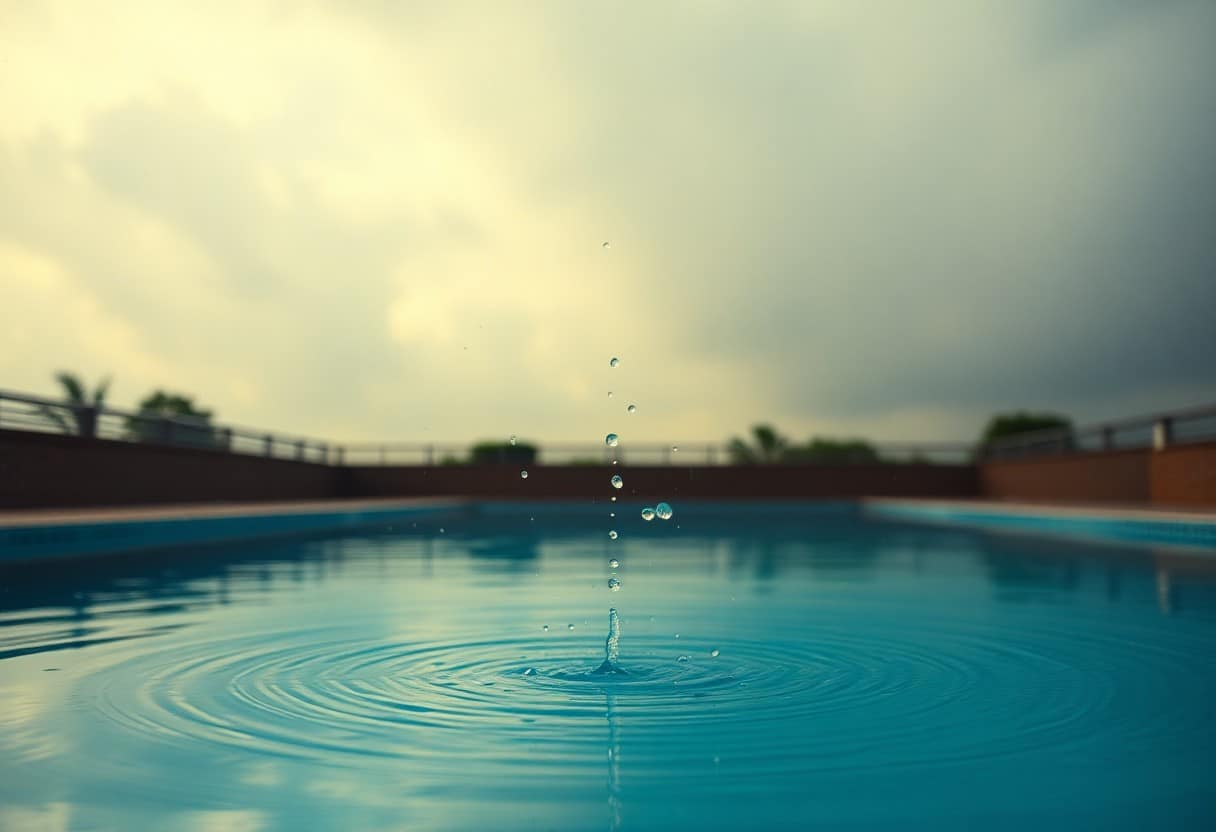Rain can significantly impact your swimming pool water, affecting its chemistry and overall quality. When precipitation enters your pool, it can dilute your carefully balanced water, altering pH levels and introducing contaminants such as dirt, leaves, and other debris. Understanding how rain influences your pool is important for maintaining a safe and inviting swimming environment. In this post, you’ll learn how to assess rain’s effects and adjust your pool maintenance accordingly to keep your water clean and clear.
How Rainwater Alters Pool Chemistry
Rainwater can drastically change your pool’s chemistry, leading to an array of adjustments you’ll need to make. The influx of rainwater introduces new elements and compounds that are not typically present in your pool system. This can result in changes to pH levels, chlorine concentration, and even total alkalinity, which can affect swimmer comfort and the effectiveness of your sanitation methods.
Impact on pH Levels
Rainwater is often more acidic than your standard pool water, usually measuring around a pH of 5.6. When this acidic rainwater mixes with your pool, it can lower the overall pH level, leading to a more acidic environment. A drop in pH can cause skin irritation for swimmers and can also impair the efficiency of your sanitizer.
Effects on Chlorine Concentration
The addition of rainwater can dilute the chlorine levels in your pool, impacting its ability to sanitize effectively. Depending on the volume of rainfall, this dilution can require you to add chemicals back to restore the right concentration for safe swimming.
After rain, you may find your chlorine levels significantly lower than the recommended 1-3 ppm. For example, if your pool had 2 ppm before the rain, a heavy downpour could drop it to 0.5 ppm or less, allowing bacteria and algae to flourish. Frequent testing after rain showers will help you understand how much chlorine you might need to add, potentially increasing the chlorine level back to optimal conditions for a safe swimming experience.


The Role of Rain in Pool Debris and Contamination
Rain acts as a natural conduit for various contaminants that can compromise your pool water’s quality. As it falls, rainwater can carry along dirt, pollen, leaves, and even small insects into your swimming pool, contributing to increased debris levels. Additionally, rain can affect the pool’s chemical balance, requiring you to adjust pH levels and disinfectants more frequently to maintain optimal water quality. The influx of foreign substances can lead not only to unsightly appearances but also to potential health hazards if not managed properly.
Introduction of Environmental Contaminants
As rain washes over the surrounding environment, it picks up dirt, grime, and pollutants, depositing them directly into your pool. This can include bacteria, algae spores, and chemicals like fertilizers from nearby gardens. Such contaminants don’t just muddle the water; they can also lead to significant challenges in maintaining a clean and safe swimming area.
Increased Organic Material and Its Impact
Heavy rainfall significantly elevates the organic material in your pool, introducing substances like leaves, twigs, and other plant matter. This not only clogs filtration systems but can also create a breeding ground for algae and other microorganisms, compromising the water quality and resulting in slimy surfaces and discoloration. It’s vital to routinely skim and clean your pool after rain events to combat these issues and restore balance.
When organic material accumulates, it doesn’t just float idly; it decomposes over time, releasing nutrients that can fuel algae growth if not promptly addressed. Algae thrive in warm, nutrient-rich environments, and even a minor spike in temperature can exacerbate their proliferation after a rainstorm. Cleaning your pool deck and maintaining a regular schedule for water testing and chemical adjustment will help mitigate the impact of increased organic matter, keeping your water clear and inviting.
The Process of Dilution: A Double-Edged Sword
Rainwater can lead to dilution of your swimming pool water, altering its chemical balance. While this process helps reduce concentrations of certain contaminants, it also brings its own set of challenges. Understanding how to manage this dilution can be key to maintaining a clean, safe pool environment.
Benefits of Rainwater Dilution
The diluted pool water from rain can help lower the levels of chlorine and other chemicals that may build up, promoting a more balanced pH. This benefit can create more comfortable swimming conditions, especially for those with sensitive skin or allergies. Additionally, if the pool water is heavily saturated with various contaminants, the rain can temporarily improve water quality by flushing some of these impurities away.
Risks Associated with Excessive Dilution
Excessive rainwater dilution can lead to imbalances that negatively affect your swimming pool. Key indicators such as pH levels and alkalinity may drop to undesirable levels, causing issues like cloudy water and algae growth. Moreover, the influx of rain can introduce contaminants from the surrounding environment, compounding existing issues rather than solving them.
When pool water becomes overly diluted by significant rainfall, it can disrupt the delicate balance of your pool’s chemical makeup. For example, a drastic drop in pH can result in eye irritation for swimmers and even cause damage to pool surfaces and equipment over time. Regular testing of water chemistry during and after heavy rain can help you identify these changes early and take corrective action, ensuring your pool remains clean and enjoyable throughout the swimming season.
Maintenance Implications Post-Rainfall
Post-rainfall, your swimming pool requires careful attention to ensure optimal water quality and clarity. Rain can introduce various contaminants, notably debris, dirt, and chemicals. These factors necessitate heightened vigilance in maintaining water balance and clarity. Regular maintenance tasks, like skimming, vacuuming, and adjusting chemical levels, become vital to restore and uphold your pool’s cleanliness and integrity following a downpour.
Recommended Water Testing Protocols
Following rainfall, conduct a thorough water test to evaluate pH, chlorine levels, alkalinity, and other vital parameters. Utilize a test kit equipped with accurate tools to gauge how the rainwater has affected your pool’s chemistry. Testing should be done within a few hours after the rain ends, as timely adjustments will help you maintain a safe and clean swimming environment.
Key Pool Maintenance Adjustments
Adjust your pool maintenance routine to accommodate for rainwater effects. After testing, specifically focus on balancing your pool’s pH and chlorine levels, which can be easily thrown off by even a small amount of rain. If the levels are disproportionate, consider adding appropriate chemicals to bring them back to the ideal ranges. Regularly cleaning and backwashing your filter also becomes necessary to remove any extra debris washed into the pool, ensuring perfect water clarity.
After a rain event, the water’s chemical dynamics can shift significantly, requiring you to rebalance quickly. For instance, pH levels should ideally hover around 7.4 to 7.6, while free chlorine levels should sit between 1-3 parts per million (ppm). You might find the pool’s alkalinity out of whack; resetting your alkalinity to around 80-120 ppm will help stabilize pH levels. Additionally, keeping your pool’s filter operational for at least 12 hours post-rain, combined with frequent testing, ensures that any potential issues like algae growth or cloudy water are tackled before they escalate.

Long-Term Effects of Rain on Pool Infrastructure
Over time, consistent rainfall can significantly impact the infrastructure of your swimming pool. Prolonged exposure to rainwater, which contains various impurities, can weaken the materials that make up your pool. By monitoring and managing these effects, you can prolong the lifespan of your pool and avoid costly repairs down the line.
Corrosion and Material Wear
Your pool’s equipment and surfaces can suffer due to the corrosive nature of rainwater. Rain often brings along pollutants and minerals which, when combined with water chemicals, can lead to rust on metal components and degradation of plaster, tiles, and other surfaces. Addressing these issues promptly will help secure the integrity of your pool’s structure.
Strategies for Protecting Pool Equipment
Implementing specific strategies can significantly reduce the corrosive effects of rain on your pool. Regularly inspecting your equipment and utilizing protective covers can shield sensitive components from direct exposure to rainwater. Additionally, ensuring proper drainage around your pool prevents water accumulation that could lead to further erosion and rust.
When protecting your pool equipment, start by investing in high-quality pool covers to safeguard against rain and debris. Regular maintenance checks should focus on treating any signs of corrosion or damage immediately, such as applying rust inhibitors to metal parts. Installing adequate drainage systems around your pool area can also prevent standing water, ensuring your infrastructure remains intact and reducing the risk of extensive repairs over time. By adopting these measures, you can maintain a secure and well-functioning pool environment even in wet weather.
Conclusion
Ultimately, rain can significantly impact your swimming pool water by changing its chemistry, temperature, and clarity. The dilution of chlorine and other chemicals can lead to unbalanced water, prompting the need for adjustments. Rainwater, often acidic, can lower your pool’s pH level, requiring you to monitor and manage it closely. Additionally, debris and pollutants carried by rain may necessitate further cleaning. By staying proactive with your maintenance routine after rainstorms, you can ensure your swimming pool remains a safe and enjoyable environment.
